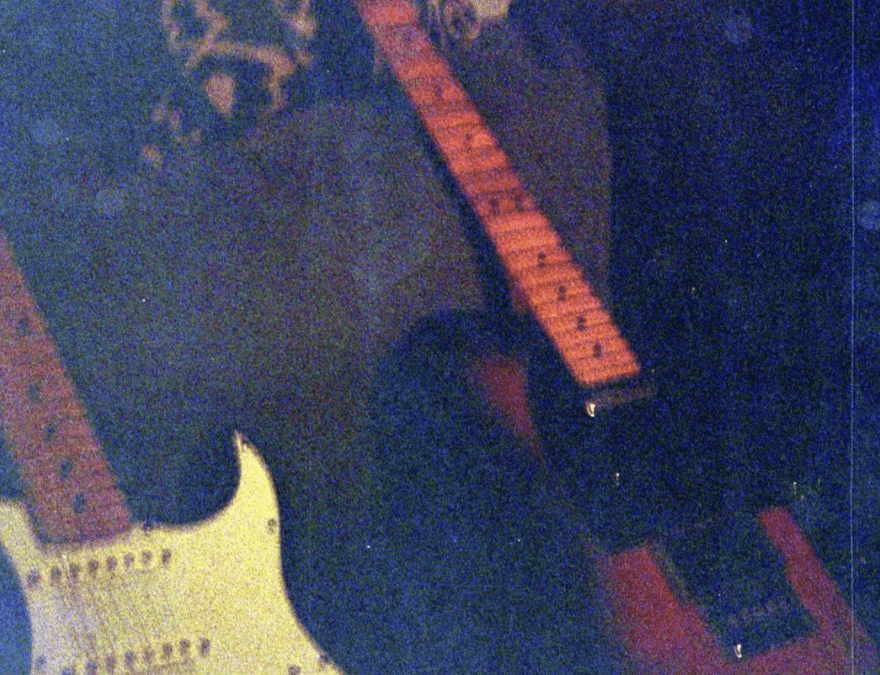Innana Darwish | Staff Writer
Paolo Kasbani, stage name paō, is an indie rock musician from the very heart of Lebanon. Even in his youth, as early as 14, paō knew he wanted to make a career out of music and have it become his world. If he could pinpoint the exact occurrence that set off his musical journey, paō would refer to some of the live recordings of the Green Day 2005 tour. The music, the ambience, and the raw passion between the audience and the band were all a setting point for him. This was all put to practice in real time when he started learning how to play the guitar and shortly after, formed a band with his high school friends in 2017. They performed at several venues, including AUB (for Outdoors), where paō studied and graduated with a degree in food sciences. The band lasted well into the very beginning of 2021, until certain circumstances led to the disbandment of Wave in Shock. During the pandemic, which halted the band’s growth, paō began to reflect on the purpose of the band and realized that for several reasons, among which the fact that the band members’ music taste had become incompatible, the band couldn’t go on. They had their final show in 2021. Regardless, the members are still on good terms and are ever so supportive of each other’s solo journeys.
After the disbandment of Wave in Shock, paō began what he calls his experimental phase. He started tinkering and exploring his sound right from home, where he would record short demos and try to find what worked for him. This resulted in the birth of ‘Alive’, his first single. ‘Alive’, released in May 2022, dealt with death anxiety and the idea of seeking a comfort person during the peak of said anxiety. Although the process of writing and recording was not as intricate and illustrative as his later works, the release of the song prompted a turning point for paō’s music, because shortly after, he performed it in Metro Al Madina among a lineup of cover songs. paō recalls the support being overwhelming, with over 120 people showing up. He reminisces on the blissful feeling of realizing that some of them, who were simply acquaintances, were mouthing the lyrics to his song.
With reassurance that solid, paō set off to work on his second song, feeling more anchored to his project. He recorded ‘Fair Weather’ almost completely in his room at home. He considers the song to be more successful, both subjectively and objectively. A slight shift from that melancholic element present in ‘Alive’ (and his sound in general), ‘Fair Weather’ was more upbeat and effervescent. The song was about a general experience, not alluding to anyone particularly but describing a general feeling of mistreatment. Adding a layer of self-awareness and actualization in the bridge, the song was multidimensional, a theme (prevalent in both the lyrics and the guitar) that you’ll later realize about paō work once I go over the last song. I asked paō, in my interview with him, if the lyric ‘picking up your dusty jackets’ was meant in a literal sense. I assumed so because of his inspiration from The Smiths, the British indie rock (and also jangle pop) band proclaimed for their straightforward, word-for-word lyrics. I found out that it wasn’t, but only insinuated at the feeling of packing up after people in an emotional sense. To clean up after someone else’s mess, if you will.
Then came ‘Glass Doors,’ an immersive, intricately layered, guitar driven and wonderful experience of a song; can you guess it’s my favorite? The song takes on a two-world kind of situation. It portrays paō battling between his imposed career path and music. The song was a result of a turbulent time in his life where he was haunted by instability and a lack of routine. The language used in the song vividly paints the pressure he felt, quite literally, in the lyrics ‘forcing me through indestructible glass doors’. As for the two-sided element, it is distinguished by the use of two different scales. The oriental one for an angry element and the major scale to introduce a more wistful one. Even the music video portrayed this distinction, using different settings and lightings to render the conflict. There’s this binary aspect, where paō is seen fully dressed in concert attire in the first half (not quite a half, a little more) playing with his ‘small band’ in this gothic house. paō describes his supposed stance in this part as being in denial to the reality of his life when he’s done ‘playing his part’ on stage. The other half shows him in his regular life, garbed in mundane clothes. Despite the sorrowful undertone, this part of the music video (and song) acknowledges the actuality. paō is much more present, very much aware of the situation, and so, as he put it, comfortable in his truth. There’s also the aspect of reflection, where he’s seen looking back at past performances, further drawing on to the conflict, but also the acknowledgement of said conflict.
paō thinks he still has much to explore, and much to develop, but is content with what he’s put out so far. He not only wants to grow as an indie rock artist, but also as a part of the collective. He hopes to get to a point further down the line where he’s able to support and publicize artists who started out just like he did. Consider giving his music a listen, and try to always keep an eye out for what bands and artists in the region come out with!

